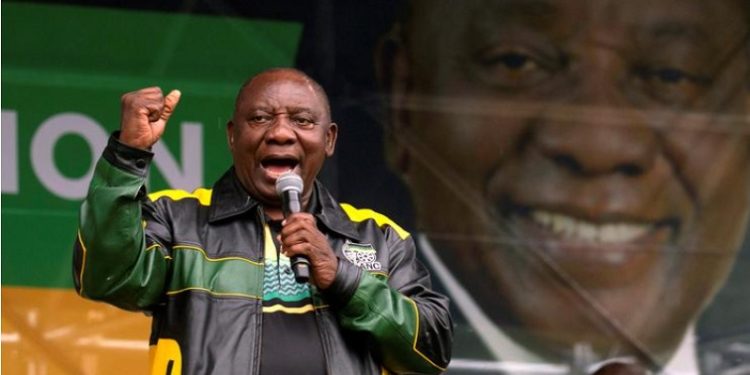The African National Congress (ANC) is once again prioritizing support for its scandal-plagued president in Parliament over the legislative body, the Constitution, and the nation as a whole. This after the nation’s former spy boss, Arthur Fraser sent shockwaves across the country when he revealed that the theft of $4 million from President Cyril Ramaphosa’s Phala Phala farm in 2020 was concealed with the involvement of state agencies and the Namibian government.
This revelation by Fraser naturally received overwhelming attention both domestically and abroad: was the money declared to the South African Revenue Services? Why was it not banked? Why was the theft not reported? How would the President know about this since he had announced that he created a blind trust to run his private businesses while he is head of state? Was this a case of money laundering? Tax evasion?
In response, the country’s official opposition, the Democratic Alliance – with the support of other opposition parties, brought a motion to be debated on the establishment of an ad hoc committee to investigate the scandal surrounding the break-in at the President’s farm. After political parties had debated the motion – ANC MPs blindly assumed defensive mode and ensured that the full constitutional and legal form of the legislative arm was in support of its leader.
The failure of Parliament to establish an ad hoc committee to investigate the Phala Phala debacle transparently illustrates the challenges of holding public officials, or political office bearers to account for their actions given the dominance of the ANC in the National Assembly. The Phala Phala scandal shows the deterioration of the ANC in Parliament to hold its members to account, regression the ANC has delivered to the doorsteps of the people it claims to best represent. This might be the biggest crisis facing the Legislative arm of the State in in 6th administration, however the institution is being negatively restructured with the sole purpose of defending one man…the same way it was done 8 years ago.
In 2014, a report by the former public protector Adv Thuli Madonsela revealed that former president Jacob Zuma had unduly benefited from upgrades to his private homestead. One of the many problems that characterised the Nkandla Project was the fact that actors involved disregarded the Constitution by deviating from the correct procurement procedures of Supply Chain Management, and because the work was done at the former President’s house, deviations were assumed to be justified and not be questioned.
There were contrasting reactions from within the ruling party. Senior ANC member and Speaker of the 4th Parliament, Max Sisulu announced that the National Assembly would immediately form an ad hoc committee to take into consideration the fateful report – a dignified man who sought to lead Parliament beyond partisanship and ensure that parliament upholds its constitutional mandate of oversight and accountability.
ANC MPs on the other hand argued that they receive their mandate from Luthuli House and that there’s no rush in working on the Nkandla report, moving to call for the committee to be disbanded and proposing the next Parliament to deal with it; the committee was then disbanded on 30 May 2014.
After the General Elections that year, Sisulu was never reappointed as Speaker and despite his seniority within the party, he was made to assume the position of backbencher in the 5th Parliament. Others such as Makhosi Khoza suffered similar fates. This was a message that whoever dared to follow the Constitution and not toe party line would be dealt with.
Just like Nkandla, the leadership of the ANC and its deployees in Parliament know that there are discrepancies and irregularities around the Phala Phala scandal but because party politics trump the state and having learnt what happens when you do not toe party line, ANC MPs continue to take their marching orders from Luthuli House.
The limited public accountability finds its origins in the fact that MPs are selected by – and answerable to – their parties rather than the voters. South Africa’s electoral system diminishes the role of public officials who rely on party chiefs for direction when performing their duties in addition to the fact that it accords disproportionate power to the executive that seems to dominate the legislature, to which it should account. The electoral system makes elected representatives to be accountable to the party, as such, MPs of the ruling party have to protect the President in order to keep their jobs.
It is politically required of them. And for as long as this is the case, Parliament will continue to fail in its constitutional obligations, unless a few others like Max Sisulu who are morally above reproach emerge from within the ranks of the ANC. But with its members merely seeing the organisation as a vehicle towards self-enrichment and state resources, that remains a pipeline dream.
Oversight and accountability are of paramount importance in establishing and maintaining a functional, responsive democracy that fulfils its promises. Yet the ruling party continues to use its majority to disregard the notion of impartiality and preside over the dereliction of Parliament. The only way Parliament can achieve its constitutional duties is only if the Electoral Amendment Bill is passed or if the majority of the ANC in Parliament is reduced below 50% – something that is within touching distant, if the results of the 2021 local government elections are anything to go by.
Vusi Gumbi is a Research Assistant at the Institute for Pan African Thought and Conversation at the University of Johannesburg


